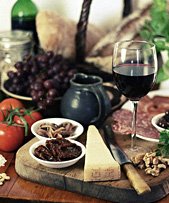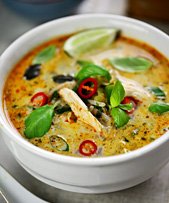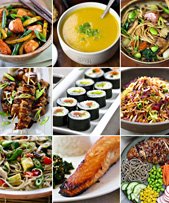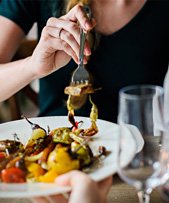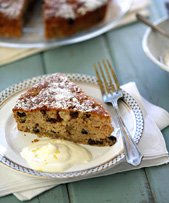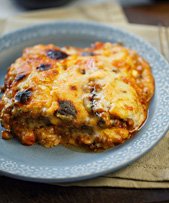A conversation with food writer and New York Times columnist Martha Rose Shulman

Recently, Ric told you about how much we enjoy Martha Rose Shulman’s simple, elegant and healthy recipes. Through her many cookbooks, and her popular New York Times column, Recipes for Health, she shows that eating healthfully doesn’t have to mean missing out on the enjoyment of good food.
Like us, Martha is passionate about ethnic food and cooking, so I asked her if she’d like to talk with me about her cooking and her food philosophy. I’m sure you’ll enjoy our enlightening conversation.
Trudy: In a career spanning over 30 years you’ve written more than two dozen cookbooks, including several award winners. You’ve also written about food in magazines such as Bon Appetit, Food & Wine, and Cooking Light. Now you also write a popular food column for The New York Times. What inspired you to become involved in food writing, and what have been the highlights of your career so far?
Martha: I was always a writer in search of a subject, and when I was about 17 I began cooking and developed a passion for it, though at that time I had no idea that it would become my career. Later, when I was in my 20s and very much involved in vegetarian cooking, I decided to make a career of it, and began teaching the recipes I’d developed, and catering. I knew that I would write a book, and when I had enough material, I sat down and wrote The Vegetarian Feast, which came out 30 years ago this year. I was very much inspired in the early days by MFK Fisher, and by Julia Child.
The high points in my career have been the publication of each book, but especially that first one, and also Mediterranean Light, which caught the crest of a wave that I didn’t even know was coming, and Provençal Light, which was very close to my heart and won a Julia Child Award. I had a long and fruitful correspondence with MFK Fisher, and met her a couple of times. Also, living in Paris for 12 years, and all the cooking that I did there. Working on my most recent book, Mediterranean Harvest, is pretty far up there as well. And now, writing the Recipes for Health column for NYTimes.com.
Trudy: Several of your cookbooks focus on Mediterranean cuisine, and it’s evident you’re also a strong advocate of the Mediterranean diet. What do you see as the main benefits of eating this way?
Martha: I think the cuisines of the Mediterranean offer such an easy and delicious way of eating well. There is so much inherent flavor in these cuisines; they are centered around produce, olive oil, and staples like grains and legumes that are the crux of a good diet.
Trudy: What other cuisines have had an influence on your cooking?
Martha: The cuisines of Mexico have had a huge influence on my cooking, because I lived in South Texas and in Austin when I was beginning my career, and traveled extensively in Mexico. When I began to develop vegetarian recipes, many of them were Mexican. My signature dish in the early days of my career was Black Bean Enchiladas. I’m inspired by the cuisines of Asia, but have not traveled in Asia, so I don’t feel that this is an area of expertise for me.
Trudy: One of the things I really like about your New York Times column is that you focus on one healthful ingredient each week, and then throughout the week you present recipes that showcase that ingredient. How did you come up with this format?
Martha: I feel that fresh, seasonal produce, and a well stocked pantry, are the linchpins of a healthy diet. So it just came to me that this would be a nice format for a weekly column — each week, either a produce item or a pantry item, alternating the two every other week, with a new recipe each day.
Trudy: Your cooking style emphasizes naturally healthy ingredients and healthful cooking methods. What would you describe as the main elements of a healthy diet?
Martha: Produce is the key. You can eat meat or not, but as long as you are eating lots of fruits and vegetables, you’re on the right track. Variety is important too. Animal protein is fine, but it should not be the central focus of a healthy diet. The more you cook for yourself, the healthier your diet will be. The less refined the food you eat is, the healthier your diet will be.
Trudy: Take us through a typical day of eating at your household.
Martha: My son, who is 11, has my blueberry pancakes with raspberries or melon, and a glass of milk most mornings. These are whole wheat buttermilk pancakes that I make every week and freeze in batches of 3, so that I can quickly microwave them and get his breakfast out early in the morning. I grab a banana, with some almond butter, before heading to the school bus, then the pool, and when I get back from exercising I usually eat yogurt. Lunch for me is quite simple, a quick break while I’m working, and at home I would eat cottage cheese and avocado, maybe a salad, or a tofu sandwich, and in summer when my tomato crop is in, always lots of tomatoes. I usually make a quesadilla for my son when he gets home from school (2 corn tortillas with some cheese in between, microwaved for a minute). Dinner is usually whatever recipe I’m testing; if you see it in my column, you know we’ve eaten it for dinner. If it isn’t, it’s often pasta with the tomato sauce I freeze every summer.
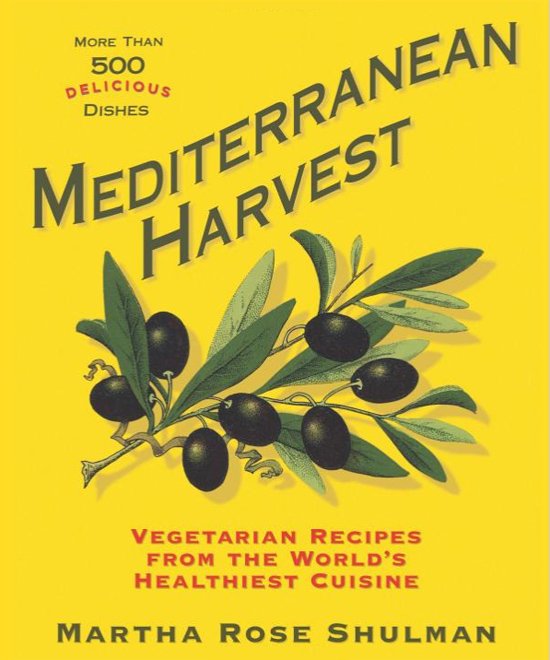
Trudy: Tell us about your new cookbook, Mediterranean Harvest, and what motivated you to write about the subject of vegetarian Mediterranean food?
Martha: When I was pondering what to write next, my agent said “Do something you’re passionate about,” and the Mediterranean and good vegetarian food are two things I’m passionate about. It was such a natural book for me to write, and of course, the research was so much fun. There is such a deep well of material.
Trudy: With the current global recession, many of us are looking for ways to cut down on our grocery bills. With your many years of cooking experience, what sort of foods would you recommend for those of us who are health-minded but also budget conscious?
Martha: You can’t do better than dried beans as a staple food that packs a huge nutritional punch. I do think fresh produce is important, even in a recession. But you can choose less expensive items like cabbages and greens. Outside of tomato season, canned tomatoes give you a lot of flavor and nutrition, and endless possibilities. When you cut meat out of your diet, or cut down on it, it will be reflected in your budget. But you won’t go hungry if you focus on beans and grains for your protein; and you’ll be consequently cutting way back on saturated fats.
You can find out more about Martha Rose Shulman at her website.
And I also highly recommend you check out her New York
Times column, Recipes
for Health.

